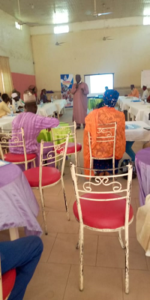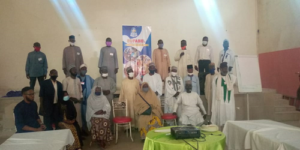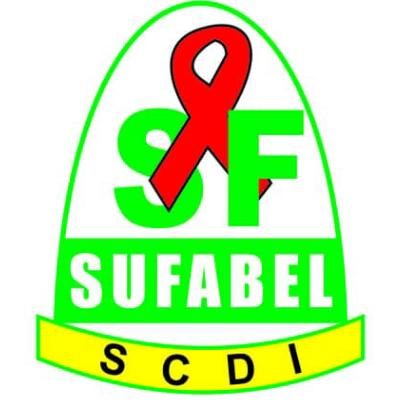ACTIVITY REPORT
Risk Communication & Community Engagement Training (Hall A)
Gombe, Nigeria
8th – 10th March, 2021
By: Dr. Nuhu Bile & Ibrahim Abdulkarim Kwami
Table of Contents
Objectives, Outcome and Deliverables. 4
Challenges and Lessons Learned. 6
Recommendations / Proposed Areas for Follow Up. 6
Annex 3: List of Participants. 10
Executive Summary
Sufabel Community Development Initiative (SCDI) is a Non-governmental/Not-for-profit Community Based Organization registered in 2013 with the Corporate Affairs Commission (NO: CAC/IT/NO 65817). Supported by King Abdullah Ibn Abdulaziz International Centre for Interreligious and Intercultural Dialogue (KAICIID), SCDI is implementing the project “Capacity Building of Interfaith Groups for Strengthening Community Response Mechanism for COVID-19 in 2 High Risk LGAs of Gombe state, Nigeria”. This project is being implemented in communities of high vulnerability to infectious diseases due to low literacy level which limits access to information, poor healthcare facilities, and most importantly low socio-economic status especially among women and young people. This training as a major strategic activity under the project was aimed at building capacity of religious leaders, women, youths and policy makers from Kwami and Yamaltu Deba LGAs on Risk Communication and Community Engagement (RCCE) on COVID 19.
Risk Communication is an essential tool in the fight against COVID-19. It is not only enough for the community to understand the preventive measures, it is equally important that they appreciate the risk and how to explain in simple terms to their family, friends and other members of the community. It is on this premises that some community influencers in the 2 religions (Islam and Christianity) are selected and trained on basics of COVID-19 infectivity, prevention, control as well as how they can communicate the risks to other members of their community. In order to understand the specific needs of target communities, a baseline assessment was conducted in the 2 LGAs using adapted WHO RCCE Action Plan Guidance. The results of the COVID 19 Risk Assessment form the basis upon which this RCCE training curriculum was developed. At the end of the training, participants developed work plans that they will use for community sensitization on COVID-19 in their various communities.
Objectives, Outcome and Deliverables
Objectives:
The broad objective of this training is to build capacity of religious/traditional leaders, youths, women and govt. stakeholders on effective risk communication for COVID-19 awareness creation among community members in 2 LGAs. Specifically, the training aims to:
- To enhance participants’ knowledge about the Novel Corona Virus disease
- To develop an action plan on Risk Communication to community members in Kwami and Yamaltu Deba LGAs using knowledge gained during the training
Outcomes:
- Participants’ knowledge on COVID-19 has been updated and all doubts/myths addressed
- Participants understood how the 6 preventive measures of COVID-19 prevent direct and indirect transmission of COVID-19
- Participants appreciate the risks associated with COVID-19 when compared to other endemic diseases
- Participants understood how to carry out effective risk communication on COVID-19 to other members of the community.
Deliverables:
The under listed are the key deliverables during the 3 days training program
- Development and delivery of a 7 module training slides which comprised of the following topics;
- What do participants know about COVID-19
- Background on COVID-19
- Preparedness and Response to COVID-19 in Gombe State
- Introduction to Risk Communication
- Questions and discussions
- Basic and Emerging facts on COVID-19
- Infection, Prevention and Control in COVID-19
- Contact Tracing and Monitoring in COVID-19
- Questions and discussions
- Ways to protect yourself from COVID-19
- Eradication of stigma, myths, misconceptions and low risk perception
- Frequently Asked Questions during Risk Communication on COVID-19: Group Work/Action Plan
- 20 participants have their knowledge improved on the Novel Corona Virus and how to engage in Risk Communication in their various communities
- A draft Action Plan was developed with time lines on how to organize town hall meetings with other community/opinion leaders and different groups in the community, and awareness creation on COVID 19 and monitoring adherence.
Implementers and Partners
Impact Stories and Quotes
“I have never really believed in COVID-19 and vaccines, have not taken any vaccine since childhood and I have discouraged several others from doing so. But this training has shown me that COVID-19 is real and I understand how the vaccine works. Going forward, I have a lot of work to do in order to convince the people in my community about my new understanding”.
M.A. (Participant from Kwami LGA)
“Usually, religious and traditional leaders are pushed to the background and only receive visitors from the government in their homes where they are informed about activities to be conducted in their communities. Now we have a shift from that and we are invited here for 3 days to participate not as listeners, but as stakeholders in drafting risk communication methods when discussing COVID-19 issues with our communities. This will surely go a long way in changing our perspectives as community leaders and also the belief of our people back home because inclusiveness breaks barriers and leaders to trust”.
A.A. (Hakimin Deba)
Challenges and Lessons Learned
Challenges
- Cost of preventive items (face masks, hand sanitizers) in the communities
- Pockets of rejection to Health Care Workers on Active Case Search/Contact Tracing in some communities
- Stigmatization to patients of COVID-19 in the communities
Lessons Learnt
- Everyone in the community is important in fight against COVID-19
- Religious leaders have a big role to play in changing community perception about COVID-19
Recommendations / Proposed Areas for Follow Up
- More religious and traditional leaders should be engaged in trainings like this from other LGAs
- Trainees should organize town hall meetings in their communities and the state PHEOC should support them with face masks and other hand hygiene commodities
Participants
(Please provide an indication of the participants: their overall number, their classification of participants (Youth, Religious leaders, policy makers etc.), the level of participation, the demographic and religious diversity, names of the high level participants.
Please include particularly high level religious leaders (HLRLs) and key stakeholders and panelists involved.)
# of participants: 20
# of male participants: 16
# of female participants: 4
# of Muslims: 9
# of Christians: 10 (3 HLRLs)
# of non-identifying participants/other religious adherents: 1 stakeholders (HIV Focal Person – Representative of Kwami LGA COVID -19 Committee Chairman)
Geographical distribution of participants: Participants were drawn from Deba, Zambuk Dadin Kowa in Yalmatu Deba LGA & Kwami, Malam Sidi in Kwami LGA
Age group of participants: 24 – 65 years
Annexes
Annex 1: Agenda:
AGENDA FOR 3-DAYS RISK COMMUNICATION AND COMMUNITY ENGAGEMENT TRAINING FOR RELIGIOUS LEADERS, YOUTHS, WOMEN & GOVT. STAKEHOLDERS IN KWAMI & YAMALTU DEBA LGAs
VENUE: Abmar Hall, Opp. Federal Teaching Hospital, Gombe
DATE: 8th – 10th March, 2021
| DAY 1
Content/Activity |
Time |
Facilitator |
| Arrival and registration | 9:30 – 10:00am | Secretariat |
| Opening prayer/Welcoming remarks and Introductions | 10:00 – 10:30am | Usman |
| Session 1: What do participants know about COVID-19 | 10:30 – 11:00am | All |
| Session 2: Background on COVID-19 | 11:00 – 11:30am | Hauwa |
| Tea Break | 11:30 – 12:00 Noon | All |
| Session 3: Preparedness and Response to COVID-19 in Gombe State | 12:00 – 1:00pm | Dr. Bile |
| Lunch Break | 1:00 – 2:00pm | All |
| Session 4: Introduction to Risk Communication | 2:00 – 3:00pm | Dr. Bile |
| Session 5: Questions and discussions | 3:00 – 4:00pm | All |
| Departure | 4:00pm | All |
| DAY 2
Content/Activity |
Time |
Facilitator |
| Arrival and registration | 9:00 – 9:30am | Secretariat |
| Opening prayer | 9:30 – 10:00am | Usman |
| Recap of day 1 events | 10:00 – 11:00am | Chris |
| Tea Break | 11:00 – 11:30am | All |
| Section 6: Basic and Emerging facts on COVID-19 | 11:30 – 12:45pm | Dr. Bile |
| Session 7: Infection, Prevention and Control in COVID-19 | 12:45 – 1:30pm | Hauwa/Chris |
| Lunch Break | 1:30 – 2:30pm | All |
| Session 8: Contact Tracing and Monitoring in COVID-19 | 2:30 – 3:15pm | Dr. Bile |
| Session 9: Questions and discussions | 3:15 – 3:45pm | All |
| Departure | 3:45pm | All |
| DAY 3
Content/Activity |
Time |
Facilitator |
| Arrival and registration | 9:00 – 9:30am | Secretariat |
| Opening prayer/Recap of day 2 events | 9:30 – 10:30am | Chris |
| Tea Break | 10:30 – 12:00 Noon | All |
| Session 10: Ways to protect yourself from COVID-19 | 12:00 – 12:45pm | Hauwa |
| Session 11: Eradication of stigma, myths, misconceptions and low risk perception | 12:45 – 1:30pm | Dr. Bile |
| Lunch Break | 1:30 – 2:30pm | All |
| Session 12: Frequently Asked Questions during Risk Communication on COVID-19: Group Work/Action Plan | 2:30 – 3:30pm | Dr. Bile |
| Session 13: Questions and discussions | 3:30 – 4:00pm | All |
| Closing | 4:00pm | All |
Annex 2: List of Speakers:
- Nuhu Bile (State Epidemioligist)
- Ibrahim Kwami Abdulkarim
Annex 3: List of Participants
| S/N | NAME | SEX | LGA | ORGANIZATION | DESIGNATION | PHONE NO |
| 1 | Asma’u Mahdi | F | Y/Deba | CAN | Member | 09072845511 |
| 2 | Rakiya Iliya | F | Y/Deba | WOWI CAN | Secretary | 08038378064 |
| 3 | Mairo Ahmed | F | Y/Deba | FOMWAN | Amira | 07035009180 |
| 4 | John Bello | M | Kwami | CAN | Finance | 08032682601 |
| 5 | Sani Baba Bojude | M | Kwami | Nasrul Islam | Imam | 08065365672 |
| 6 | Yahuza Zakariya’u | M | Kwami | Nasrul Islam | Imam | 08025180709 |
| 7 | Umar Usman | M | Kwami | JIBWIS | Imam | 08141925151 |
| 8 | Ahmed Adamu | M | Kwami | LGA Office | Desk Officer | 07069138173 |
| 8 | Pst Samuel A. Usman | M | Y/Deba | BFC | Clergy | 08022494352 |
| 9 | Zakari M. Bukar | M | Kwami | Fityanul Islam | Imam | 08144970975 |
| 10 | Pst Obasanjo Yunana | M | Y/Deba | CAN | 08074507805 | |
| 11 | Pst Samuel | M | Y/Deba | CAN | 07063032089 | |
| 12 | Aishatu Umar | F | Kwami | FoMWAN | Shugaba | 07044115116 |
| 13 | Ibrahim Saidu | M | Kwami | IRPA | PRO | 08088489649 |
| 14 | Churi Frederick Fidelis | M | Kwami | CAN | Youth | 08130201867 |
| 15 | Haruna Aji | M | Y/Deba | Hakimi Palace | Wakilin Hakimi | 08106585970 |
| 16 | Samuel Doka | M | Kwami | CAN | Treasurer | 07011593498 |
| 17 | Anthony Bitrus | M | Kwami | CAN | Secretary | 08060373393 |
| 18 | Henry Ogharanduku | M | Y/Deba | CAN | Youth | 08036345443 |
| 19 | Sani Abdullahi | M | Y/Deba | JIBWIS | Chairman | 08062856333 |
| 20 | Mamuda Abdullahi | M | Y/Deba | JNI | Mai Tafsir | 08168064888 |
The training faculty which comprised of 2 Consultants and SCDI program staff had series of meetings (February 26th & March 3rd, 2021) at SCDI office (Gombe) to plan on the training curriculum and method of delivery that could best serve our target audience. Key outputs from these meeting are: Review of the training curriculum, slides and agenda, as well as assigning of tasks among facilitators. Daily review was conducted by the Training Faculty throughout the 3 days program to evaluate each day’s work i.e. identify what worked well and what did not so as to improve the learning experience of participants
Arrival and Registration/Attendance
The Program officer (SCDI) warmly welcomed participants to the training venue. Thereafter, participants were taken through the registration process for the training and the pre-packed workshop folder consisting of the training materials and stationeries were given to them after due completion of the registration and other protocols. The location of Conveniences was directed to the participants.
Training Faculty
The training faculty consisted of two resource persons (hired consultant) in the lead, and staff of SCDI who were tasked with providing administrative and logistics support. On daily basis, participants were assigned responsibility to manage each day’s sessions and were further challenged to write the day’s activity report to be shared at plenary the following day for other participants to critique and make input. The lead facilitator and SCDI team deployed appropriately the needed skills and techniques needed during the three days training. The resource persons guided and supported participants to accomplish small group tasks given
Annex 5: Challenges
- As much as participants showed appreciation for the opportunity to be part of the training, many felt more of their congregation members should have been included
- There were few delays in sessions after break as participants usually fraternized with others from their LGs who were in the other Hall. While the plan to mix participants from the 2 LGAs in different Halls to promote experience sharing and cross fertilization of ideas worked well, future meetings/seminars should be located at different venues
- The RCCE action plan developed could not be finalized as participants needed inputs from other stakeholders/community leaders who could not be part of the training
Annex 6: Action Pictures

Facilitator & Participants in Plenary

Participants in Small Working Group

Question and Answer Session

Participants presenting RCCE Work Plan

More Plenary Presentation

Group Picture after the training
